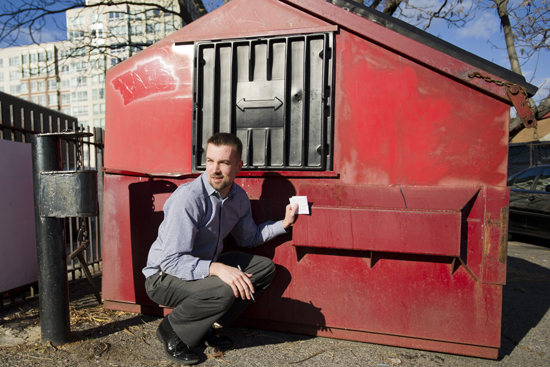How Far Would You Go for $20?
MED alum, partner hide money, then Net-case location

Richard Cook (MED’03) hides $20 recently—and we’re not saying where. Photo by Cydney Scott
Remember that hit from TV’s golden era, The Millionaire, about an inexplicably generous rich guy who gave away a fortune each week to a total stranger?
This is not that story. In this one, the stranger comes away with only $20, but the story has the advantage of being true.
Since September 21, Richard Cook (MED’03) and business partner Steven Grant have dappled greater Boston with $20 bills, one a day, for anyone to find. They tip off the world to each day’s location on their Plenty of Twenties website, posting the information at varying times each day.
After that, fortune favors the fleet.
“We have hidden the money as far away as Lowell,” 30 miles from Boston, Cook says. Other hiding places include in front of the Beacon Hill home of U.S. Senator John Kerry (Hon.’05), beneath a Faneuil Hall statue, and inside the helmet of the Ted Williams statue by Fenway Park.
Started as an experiment in human behavior (Cook is a psychiatrist), the cash-stash is, according to their site, an effort to answer a simple question: “How far would people go to grab it?” Apparently, as far as necessary: most of the hidden bills have been scooped up by people checking the site each day, says Cook, although there have been exceptions. “The $20 we hid at Walden Pond was found two days after it was hidden by someone who just happened to come across it.” The partners request that a finder notify them, but occasionally a bill walks off without anyone alerting them. And once in a while they’ll secrete more than one $20 bill.
The duo devised the dollars dump after observing a friend who drove an hour, round-trip, from his job to his home each day to walk his dog. Surprised that someone would choose such economy over the convenience of paying $20 for a dog walker, Cook mused to Grant about whether someone would drive 30 minutes to snare $20. Intrigued, Grant hid $20 in the Wakefield, Mass., public library and announced the drop on Facebook. An hour and a half later, a friend picked up the money. Continuing the drop each day seemed an interesting way to make people happy, says Cook, and after all, the economy needs the stimulus. An idea was born.
Almost all the money comes from the two, although they have coaxed friends with businesses into sponsoring a “20 for a day” and hiding it in their workplaces, Grant told U.S. News & World Report, which reported on Plenty of Twenties in November.
Cook and Grant, who is a lawyer, have a long history as cutups. Buddies since nursery school, they were voted “co-class clowns” at Wakefield High School, according to their site, which also confides: “Rich was a member of the Honor Society and Steve was kicked off the student council for arguing that cheerleading was not a sport.”
How long will the two friends keep it up? As long, they say, as they are having fun.

Comments & Discussion
Boston University moderates comments to facilitate an informed, substantive, civil conversation. Abusive, profane, self-promotional, misleading, incoherent or off-topic comments will be rejected. Moderators are staffed during regular business hours (EST) and can only accept comments written in English. Statistics or facts must include a citation or a link to the citation.